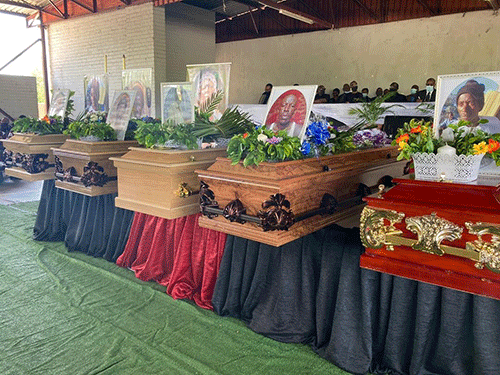The International Criminal Court has rejected the Caprivi Concerned Group’s request to launch an investigation into the killing of four fishermen by the Botswana Defence Force for potential crimes against humanity.
The court said it lacks jurisdiction to investigate this matter.
The three brothers, Tommy (48), Martin (40) and Wamunyima Nchindo (36) and their cousin Sinvula Muyeme (44) were shot by the BDF on 5 November 2020 along the Chobe River.
The incident fuelled protests and a call to the Botswana government to stop its unwritten ‘shoot-to-kill policy’ along the border with Namibia. The concerned group in August 2022 asked the ICC to investigate Botswana president Mokgweetsi Masisi and his defence chief Placid Segokgo over the “extrajudicial killing or murder” of the four men. However, in a letter to the CCG, the ICC said they can not investigate. The ICC is an intergovernmental organisation
and international tribunal seated in The Hague, Netherlands. It is governed by the Assembly of States Parties, which is made up of the states which are party to the Rome Statute.
“Based on the information currently available, the conduct described in your communication does not appear to fall within [our jurisdiction]. Accordingly, as
the allegations fall outside the jurisdiction of the court, the prosecutor has confirmed that there is no basis at this time to proceed with further analysis,”
ICC head of information and evidence unit in the office of the prosecutor, Mark Dillon, said in a letter to the CCG dated 20 September.
“The information you have submitted will be maintained in our archives, and the decision not to proceed may be reconsidered if new facts or evidence provided a reasonable basis to believe that a crime within the jurisdiction of the court has been committed.”
He said the ICC only exercises jurisdiction over persons for the most serious crimes of concern to the international community as a whole, namely genocide, crimes against humanity and war crimes.
CCG secretary general Edwin Samati yesterday said the group is still consulting lawyers on the decision, adding that they nevertheless submitted the Nchindo brothers’ execution to the United Nations High Commissioner for Human Rights (UNHCHR) last week, hoping that the UN Special Rapporteur on extrajudicial killings and arbitrary executions will examine the matter, share it with relevant stakeholders and accordingly engage the Botswana government.
“Although the foregoing decision is negative, and we strongly disagree with it, we appreciate the fact that the court indicated that it remains open and
available to reconsider its current decision, should we provide new facts or evidence on the matter,” Samati observed.
“In other words, the court suggests that we submit more facts and evidence on admissibility to fit it among crimes which the court is mandated to prosecute. We will pursue the matter with the ICC until justice prevails.” The revelations come just days after President Hage Geingob reminded outgoing Botswana high commissioner to Namibia that the relationship of the two neighbours could be frayed when they kill each other’s citizens.
Geingob previously said the incident is being handled at the highest level between the two neighbours.
On Wednesday, he told outgoing diplomat Batlang Serema “we cannot consider ourselves good friends when incidents like that shooting are taking place.”
During her inquest ruling earlier this year, Botswana regional magistrate Taboka Mopipi found that the BDF had no intent to kill, but only retaliated after the slain fishermen shot at them.
Therefore, the BDF members cannot be held criminally liable for the deaths of the deceased persons, she said.
The ICC can prosecute individuals for genocide, crimes against humanity and war crimes. The ICC constantly faces criticisms
of bias, Eurocentrism and racism, a questioning of the fairness of its case-selection and trials procedures, and doubts about its effectiveness.


